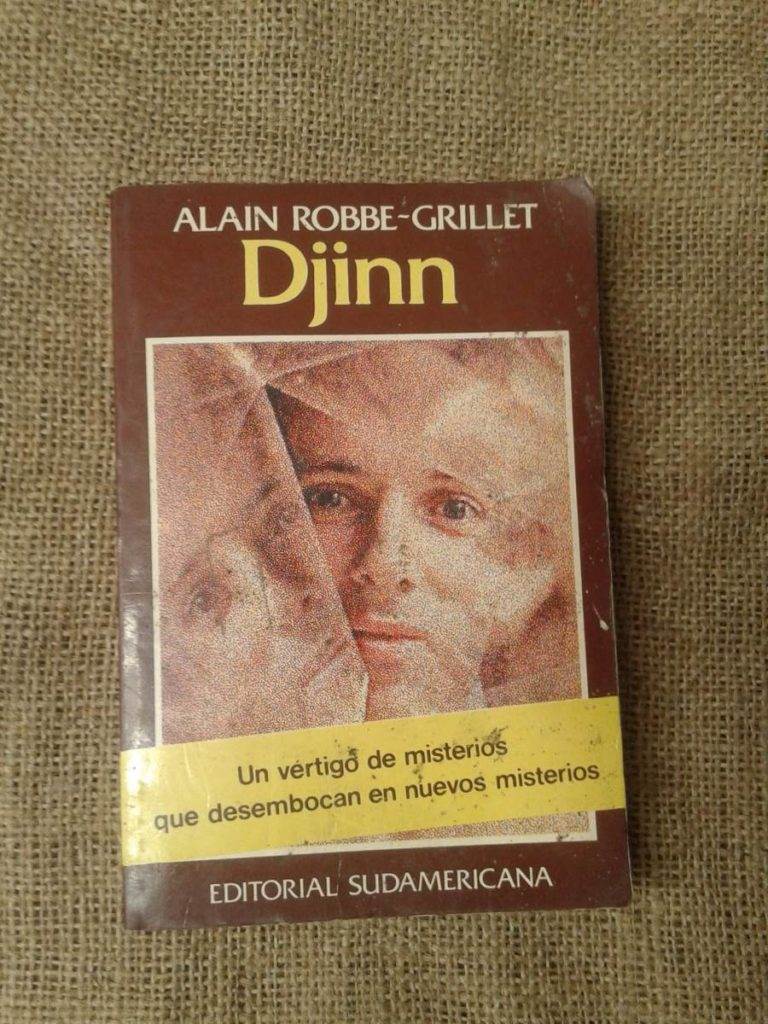
It must be out of some utterly bizarre randomness that one comes across a book which is not only having this remarkable quality of shifting and reorganizing ways of thinking about the question of potentiality of the writing expressiveness in general, but is also forcing us to believe that the fabric of reality is likely to have been woven (is being woven right now?) by threads even more dazzling with oddness than it would be possible to imagine, having a godlike insight into the nature of the non-existent things themselves. As a kind of self-contained as well as finite wholeness, Djinn, authored by the godfather of the Nouveau Roman himself – Alain Robbe-Grillet – takes us on a head-spinning journey throughout fractalic paths of feverish assumptions, rhizomic patterns of interpretations and, last but not least, kaleidoscopic infinitudes of questions and doubts regarding temporal and spatial “scenography” of the plot, the identity of a mysteriously multiplied therefore totally unreliable narrator and – what’s even more jaw-dropping – the lightness of turning the reader into one ontologically curious investigator. These are the most common phenomena that are unexpectedly and instantly conjured in the “vicinity” of the relation between the reader and the novel. So what kind of powerful genie is hiding inside this fascinating lamp?
Djinn, consisting of eight short chapters, framed by a prologue and an epilogue, at first glance presents itself as a seemingly typical spy story. We are informed that the protagonist – Simon Lecoeur – nicknamed by his peers and fellow students “Yann” – who was employed as a contemporary French literature lecturer in one of the American schools in Paris, had gone missing. Having burrowed through his belongings, the police found several traces which indicated that Mr. Lecoeur’s identity could or even should be brought into question. One of the most vivid yet simultaneously obscure pieces of evidence was a manuscript, neatly typed and left on his desk. The novella, being less than 100 pages long and comprising eight short chapters of a presumably semi-autobiographical character, described the lecturer’s unsuccessful attempt to follow a mission ordered by a mysterious woman named Jean who, in all likelihood, was a recruiter or other highly-ranked agent of a leftist, Luddite-like organization which main aim was to put an end to the enslaving hegemony of the machines. Or so it seems, at least after a couple of dozen pages, when things are beginning to get weirder and weirder…
As regards giving away other details of the plot, I wouldn’t have the heart to let myself go and get enchanted by further slips of the tongue, mainly because of the fact that the flow of the odd occurrences in the novel serves as a perfect example of how the reader should challenge him/herself to bite his/her tongue. However I suppose I’ve already bitten mine not quite as hard as I should have… Therefore, to sink even deeper inside my self-inflicted pricks of conscience, after having spilled too many beans about the novel anyway, I’m going to sin some more. At the very worst, I’ll get jinxed by the indefinable and ethereal Djinn. Or, what is more probable, I’ll get “jeanxed”…
To be completely honest, Djinn, being an anti-novel of the highest possible quality, provokes the reader to adjust him/herself to the particular sort of ‘pristine’ perceptive position. Theoretical assumptions of the Nouveau Roman, reaching its peak of popularity and influence in the 50’s and 60’s, were to abolish all the constituents associated with mimetic traits of the writing. To make a long story short, the sentences weren’t supposed to represent or show no more of the following: psychological depths of characters, descriptions of surroundings used only as a background for states of affairs happening “on” them, the causality of the events and their everlastingly strange affinity with temporality, etc. Along with Alain Robbe-Grillet, writers like Marguerite Duras, Jean Ricardou, Nathalie Sarraute and Michel Butor wanted to strip words right down to their “underwear” of non-figurativeness, to erase their previous tendencies of getting clenched between the teeth of picturesqueness. They wished to evoke and extract new functions or even “abilities” of sentences and, by doing so, construct and investigate more abstract and conceptual approaches towards drenching and, on the other hand, draining the oceanic realm of literature.
Being put under the spell of the Nouveau Roman’s charming prose, it’s impossible to wash away a conviction that Djinn was truly conjured up by some of the finest waves of Poseidon’s trident. Not to mention the fact that the most common after-effects or – putting it more playfully – after-images of reader’s confrontations with these wonderfully wordless and sometimes wordlessly wonderful endeavors are the ones which could be easily referred to as the bold dives into the wavy waters of philosophy. Especially when we are sitting breathlessly perplexed by narrative transformations which suggest that, for instance, all of Simon’s actions, which he hoped to get him finally recruited by the mysterious, technophobic urban guerrillas, could have been prefabricated or even meta-prefabricated (by who?) and then, all of the sudden – multiplied by each other (how?), almost unnoticeably overlapped (when?) with these unnamable blends of vaguely infinitesimal differences and countless discrepancies – these jungles of multi-dimensional translucent mosaics leave us with one particular feeling of constant, oscillating “drills”, “thrills”, “spills” or even “chills” inside (outside too!). And these “–ills” generate loads of questions. Which ones? I’ll leave it up to you. Or better yet – let Djinn/Jean/Jan/Yann decide for you. Frankly, these are her/his/its territorial waters…
Unquestionably, the amount of magic trapped inside this peculiar novel, when released, would be sufficient to distribute it among many other books and still the genie inside (or the Jeanie inside…) wouldn’t mind losing the plurality of its powers. As in Nabokov’s “Transparent Things” or Gombrowicz’s “Cosmos”, the source of potential hexes, curses and other alluring machinations seems unquenchable. And it’s waiting for you, pulsating with the lurking rhythm of the ebbs and flows of its own tide, to rub the lamp. Do it. You won’t have any regrets.




